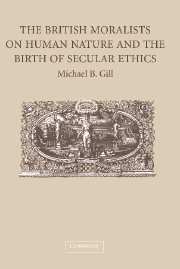Book contents
- Frontmatter
- Contents
- Introduction
- PART ONE WHICHCOTE AND CUDWORTH
- PART TWO SHAFTESBURY
- 6 Shaftesbury and the Cambridge Platonists
- 7 Shaftesbury's Inquiry: A Misanthropic Faith in Human Nature
- 8 The Moralists; a Philosophical Rhapsody
- 9 Shaftesbury's Two Reasons to Be Virtuous: A Philosophical Fault Line
- PART THREE HUTCHESON
- PART FOUR DAVID HUME
- Notes
- Bibliography
- Index
7 - Shaftesbury's Inquiry: A Misanthropic Faith in Human Nature
Published online by Cambridge University Press: 29 July 2009
- Frontmatter
- Contents
- Introduction
- PART ONE WHICHCOTE AND CUDWORTH
- PART TWO SHAFTESBURY
- 6 Shaftesbury and the Cambridge Platonists
- 7 Shaftesbury's Inquiry: A Misanthropic Faith in Human Nature
- 8 The Moralists; a Philosophical Rhapsody
- 9 Shaftesbury's Two Reasons to Be Virtuous: A Philosophical Fault Line
- PART THREE HUTCHESON
- PART FOUR DAVID HUME
- Notes
- Bibliography
- Index
Summary
In 1699, a year after Shaftesbury completed his edition of Whichcote's sermons, an anonymous version of Shaftesbury's Inquiry concerning Virtue, or Merit was published. Shaftesbury would later claim that he did not think that the 1699 manuscript was fit for public consumption and that the person who had the book published (probably John Toland) acted against his wishes. Shaftesbury even went so far as to buy up and destroy all the copies of the book he could find. Or so he said. At the same time, Shaftesbury seems to have allowed a fair number of people to read the unpublished manuscript in the years prior to 1699. And there is good evidence that in 1701 Shaftesbury himself initiated a French translation of the book, a copy of which he had sent to his friend Pierre Bayle, “to whom I fancy it will be agreeable” (Klein 1999, x). So there is some reason to question his later protestations that the 1699 edition was “an unshapen Foetus, or false birth” whose publication was entirely “contrary to the Author's design” (Klein 1999, x). In any event, Shaftesbury revised the Inquiry and published authorized versions in 1711 and 1714.
In this chapter, I examine claims that are central to both the early and late versions of the Inquiry, using passages that (unless otherwise noted) appear virtually unchanged in all editions. So the ideas I'll discuss in this chapter are ones that Shaftesbury developed quite early in his intellectual career and never disowned.
- Type
- Chapter
- Information
- Publisher: Cambridge University PressPrint publication year: 2006



